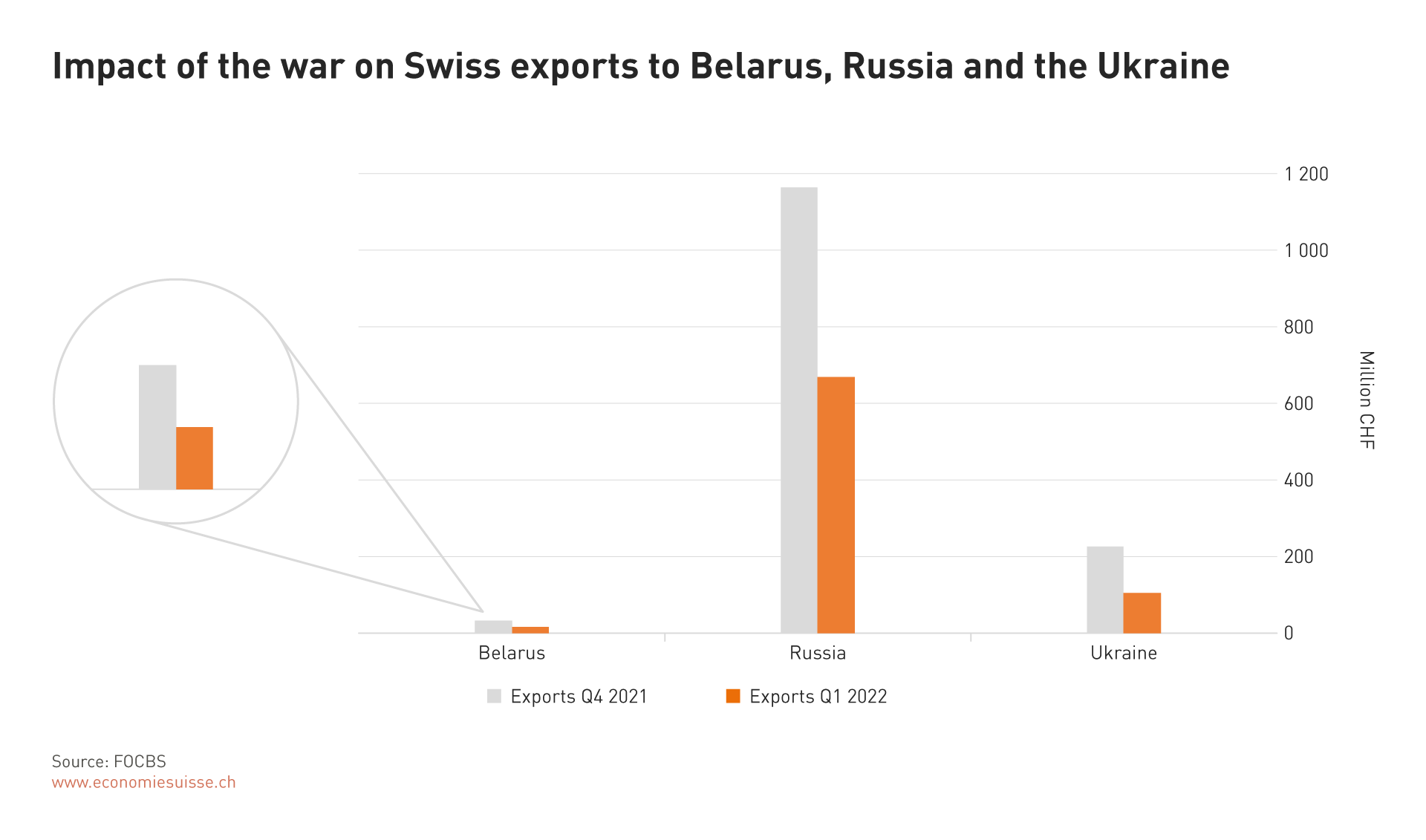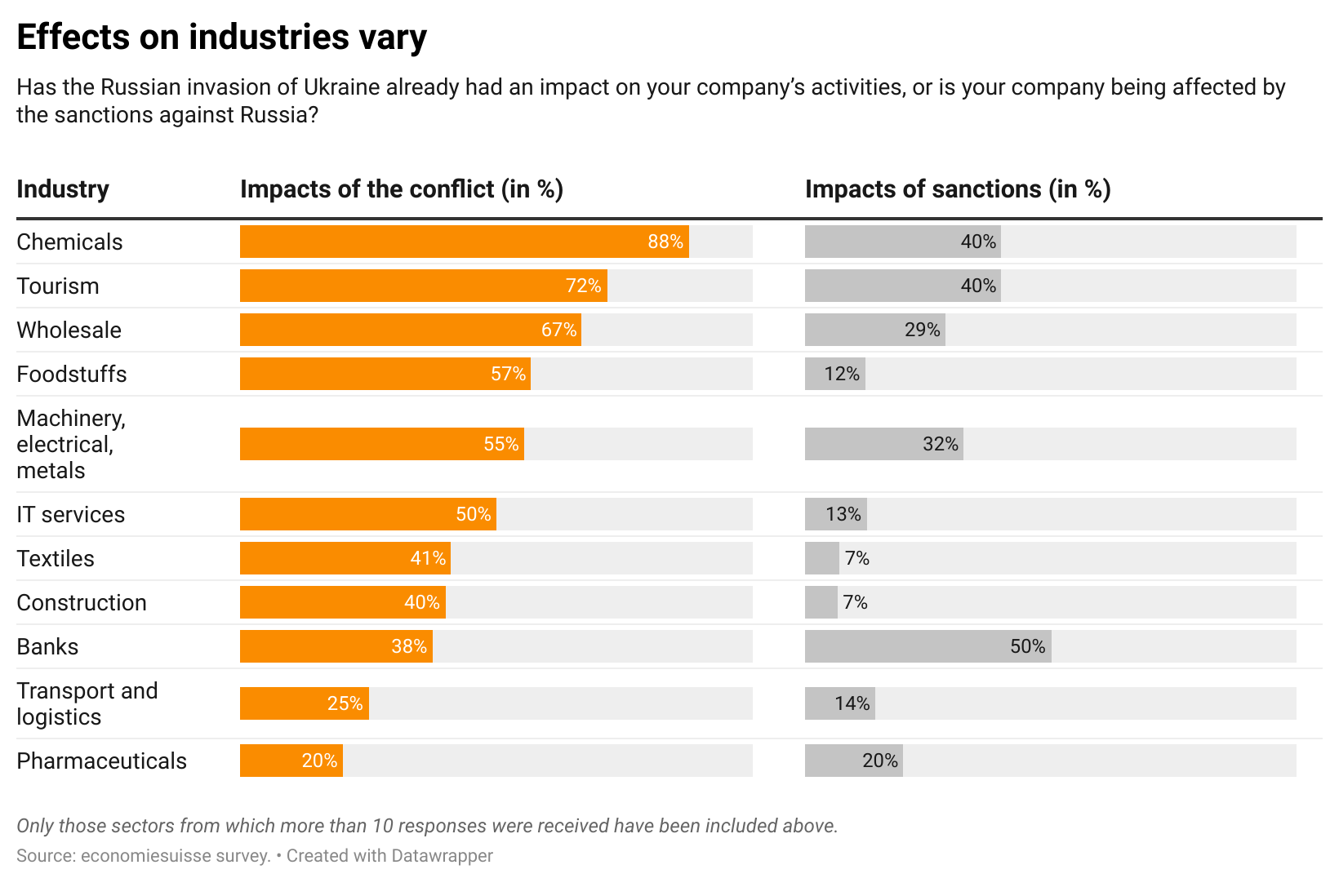The Swiss economy and the war in Ukraine – economic and humanitarian perspectives
- Introduction Executive summary | Positions of economiesuisse
- Chapter 1 The war in Ukraine also affects Switzerland
- Chapter 2 Economic impact
- Chapter 3 Swiss companies’ humanitarian engagement
- Chapter 4 Conclusion: Tragedy of war in Ukraine prioritises humanitarian aid
Economic impact
Switzerland had long-standing bilateral economic relations with Russia and Ukraine before the war. But Russia’s annexation of Crimea in 2014 and the invasion of Ukraine in 2022 countered by measures taken by the Swiss authorities and sanctions imposed by the international community have severely affected Switzerland's economic relations with the two countries. Figures compiled by SECO, by the Federal Office for Customs and Border Security (FOCBS) and the Swiss National Bank bear this out.
Bilateral trade relations with Russia of limited relevance for the export industry
Before the war, Russia was the eleventh largest economy in the world. About two-thirds of its exports consist of oil, petroleum products and natural gas. The large share of commodities in its exports makes the Russian economy vulnerable to price fluctuations on the commodity markets. For the Swiss export industry, Russia is of limited importance. Total bilateral trade with Russia was CHF 4.7 billion in 2021 (export and import, total 2), with Swiss exports accounting for CHF 3.4 billion and imports for CHF 1.3 billion. Russia ranked 23rd among Switzerland's most important trading partners in terms of goods for 2021. Exports to Russia include mostly chemical and pharmaceutical products, precision instruments/watches and machinery while Switzerland mainly imports precious metals from Russia.
Compared to the bilateral trade in goods, the volume of services traded is significantly lower. In 2020, Switzerland exported services worth CHF 2.3 billion to Russia and imported services worth CHF 0.9 billion in return. Swiss service exports to Russia in 2020 primarily comprised transport services, licenses, and financial services. On the import side, transport services also account for the largest share. Swiss direct investments in Russia totalled CHF 27.8 billion at the end of 2020. Swiss companies employed more than 39,000 people in Russia in the same year.
Starting in 2014, the Swiss government took steps to prevent the circumvention of international sanctions related to the annexation of Crimea. Negotiations for a possible free trade agreement between the states of the European Free Trade Association EFTA (Switzerland, Norway, Iceland, and Liechtenstein) and the then customs union between Russia, Belarus and Kazakhstan were also suspended.
War stops positive trend in economic relations with Ukraine
After the Maidan Revolution of 2014, Ukraine increasingly turned towards the EU both politically and economically. This reorientation of the Ukrainian economy also had consequences for the bilateral economic relations with Switzerland. Although still relatively small, they have developed very positively in recent years. In 2020, Ukraine ranked 64th among Switzerland’s trading partners. In 2021, trade between the two countries reached a new high of CHF 831 million, an increase of 12.9 percent over the previous year. Switzerland exports mainly chemical and pharmaceutical products, precious metals, and precision instruments/watches, while Ukraine exports textiles, agricultural and forestry products, and precision instruments/watches to Switzerland.
Different as with Russia, trade in services from Ukraine to Switzerland is more important in comparison to trade in goods. According to the latest figures available, Switzerland is the third most important importer of Ukrainian services. Switzerland, on the other hand, is the fourth biggest investor in Ukraine (USD 2.7 billion, International Monetary Fund) and was present in the country before the war with numerous different projects for SECO's economic development cooperation. Certain of these projects are being continued, albeit adapted to current needs.
The war has severely impacted bilateral economic relations between Switzerland and Ukraine. Companies have had to limit or completely stop local production. Imports and exports are no longer possible in some cases due to the war and logistical problems. The specific impacts vary from company to company. The long-term consequences cannot yet be precisely assessed. Clearly, the war and the large-scale destruction of infrastructure will continue to affect the economic development of the country for years to come.
Sanctions also affect Switzerland's trade relations with Belarus
As Switzerland has also tightened its sanctions on Belarus, the economic relations between the two countries are obviously affected by the current situation, albeit to a significantly lesser extent. Economic ties between Switzerland and Belarus were not close even before the war. According to FOCBS statistics, bilateral trade in goods totalled a mere CHF 158 million in 2021 (total 2) with Swiss exports of just under CHF 109 million and Belarusian exports to Switzerland of almost CHF 50 million. Economic framework conditions deteriorated in 2020 due to unrest and political instability in the wake of the presidential election. This trend is likely to continue under the current circumstances.
Since the outbreak of the war, bilateral trade flows between Switzerland and the three countries have plummeted.

Indirect effects of the war in Ukraine potentially serious for Swiss economy
The direct impact of sanctions on bilateral trade relations is rather small for the Swiss export industry and the financial centre.
Indirectly, however, the war poses major challenges to both the Swiss and global economy. The war is exacerbating existing supply chain bottlenecks. This makes the procurement and production of certain products such as chips, cars or building materials more difficult and expensive. Both Russia and Ukraine are important energy and food exporters, and their industries produce important industrial factor inputs. For example, a large part of the world's nickel and palladium production comes from Russia. Ukraine is the world's largest producer of neon. Likewise, metals relevant to industry such as iron, steel, aluminium, copper, platinum, or titanium are produced in the two countries. Due to the volatility of the prices for these raw materials, many industrial companies are facing great planning uncertainty. Various countries have also reduced imports of Russian crude oil and natural gas or are discussing such steps. Energy supply is also a challenge for Switzerland in connection with the war in Ukraine.
Except for banks, the indirect effects of the war are more significant for all sectors than the direct consequences of the sanctions.

According to a survey conducted by economiesuisse at the beginning of March this year, every second Swiss company participating in the survey is affected by the economic impact of the war. In addition to the war-related difficulties with the procurement of raw materials, Western sanctions such as restricted payment transactions with Russian banks or export bans, and the distortions on the energy markets are also burdening companies.





